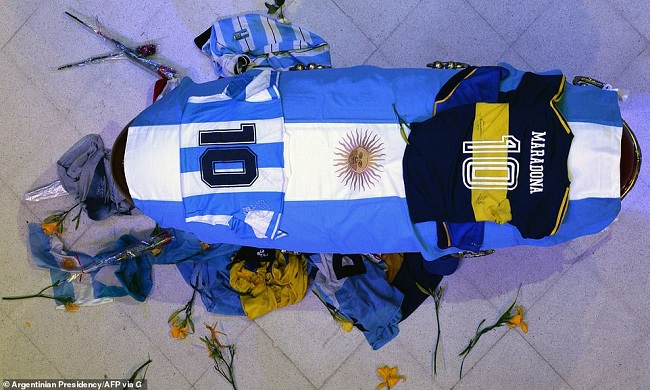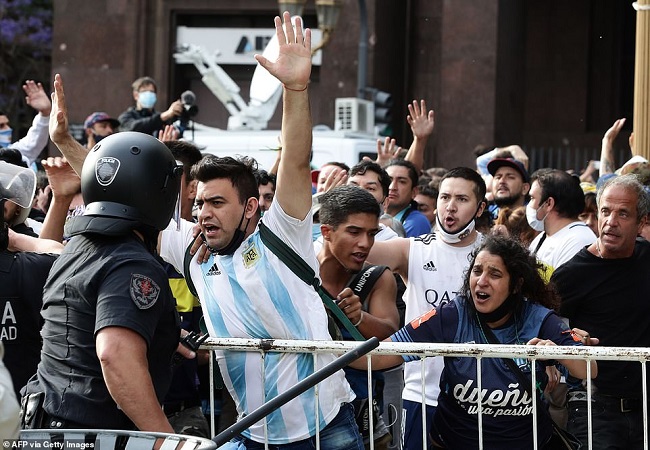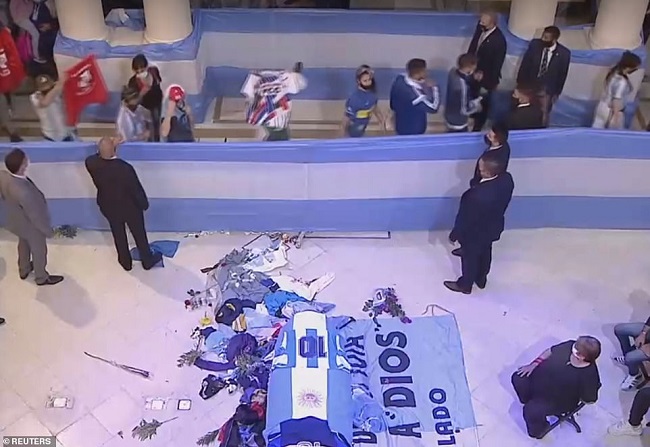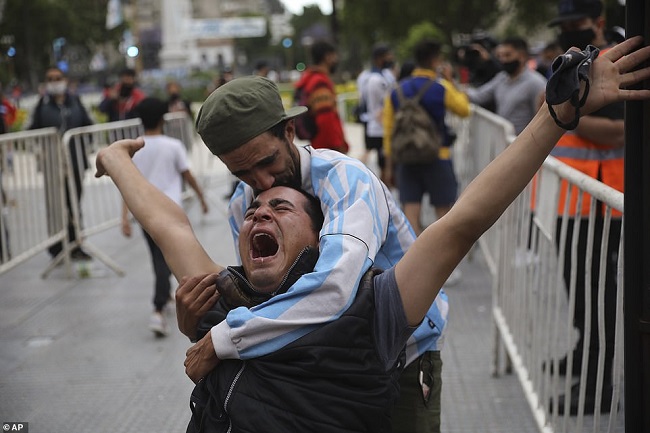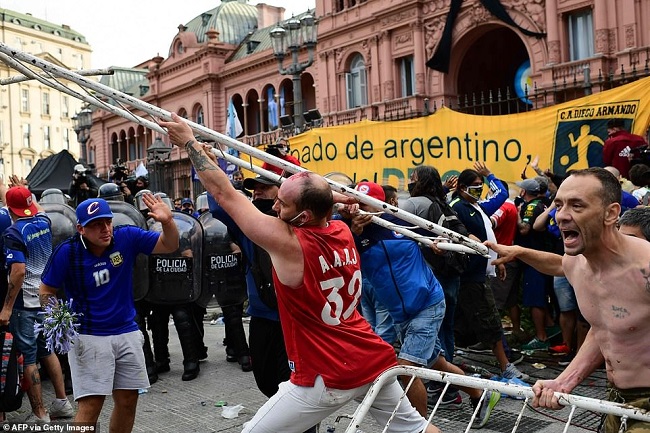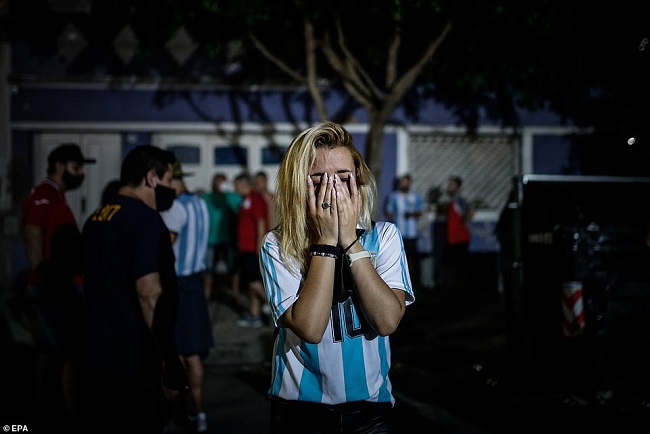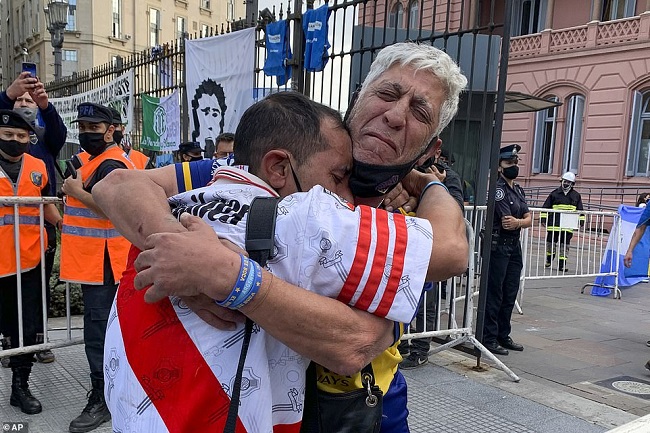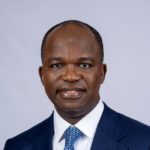Grieving football fans scuffled with police as they lined up to pay their respects to Diego Maradona’s coffin today, Daily Mail reports.
This is just as a lawyer for the Argentinian legend accused medics of ‘criminal idiocy’ over his death.
Thousands came to say farewell to their hero at the presidential palace in Buenos Aires, where Maradona’s casket is lying in state after he died of a heart attack on Wednesday at the age of 60.
Clashes broke out as fans jostled to get inside and see the coffin, which was covered in an Argentinian flag and Maradona’s signature number 10 shirt after arriving in an ambulance early this morning.
A long line of mourners streamed past Maradona’s body, clapping, pumping their fists and throwing flowers, flags and football shirts at the foot of the casket, on the first of three days of national mourning in Argentina.
Regarded by some as the greatest player of all time, Maradona combined awesome footballing ability with a flair for showmanship and a turbulent personal life marked by drug and alcohol problems.
Lawyer Matias Morla claimed today that Maradona was left for 12 hours without aid at some point before his death on Wednesday, which came two weeks after he had brain surgery to remove a blood clot.
‘It is inexplicable that for 12 hours my friend had no attention or check-up from the personnel dedicated to these ends,’ he said.
Morla also claimed it was ‘criminal idiocy’ that an ambulance took 30 minutes to arrive and vowed that the circumstances surrounding Maradona’s death would be be ‘investigated to the end’.
Maradona’s family and closest friends came at dawn before the start of the public wake, before the scuffles broke out as crowds jostled to enter and police had to hold people back.
The coffin procession took place just hours before Maradona is due to be buried on the outskirts of Buenos Aires, in the same Jardin de Paz cemetery where his parents were also laid to rest.
‘Maradona for me is the greatest thing that happened to me in life. I love him as much as my father and it’s like my old man died,’ Cristian Montelli, 22, one of the mourners at the palace today.
‘If I die young, hopefully upstairs I can play ball and watch a Boca game with him,’ added Montelli, who had a tattoo of Maradona’s face on his leg, after he saw the casket.
Others gathered last night outside the Buenos Aires stadium where Maradona began his career and which has since been renamed in his honour, setting up a makeshift shrine to celebrate the legendary World Cup winner.
Maradona’s death has also been keenly felt in Europe, especially in Naples where he steered an unfashionable side to two Italian league titles and where fans let off flares in tribute outside the stadium last night.
In Britain, where he is best remembered for his ‘Hand of God’ goal against England in 1986 – an act of brazen cheating followed only minutes later by one of the greatest goals in football history – a minute’s silence took place ahead of Liverpool’s Champions League match on Wednesday night.
An autopsy report leaked to Argentine media said Maradona died in his sleep after suffering heart failure, only two weeks after leaving hospital following the brain surgery.
Medics also detected dilated cardiomyopathy, a medical condition in which the heart muscle becomes weakened and enlarged and cannot pump enough blood to the rest of the body.
His nephew Johnny Esposito was the last person to see him alive, according to the leaked report, before doctors with an appointment to see him went to his estate on Wednesday and found him unresponsive.
Three days of mourning have been declared by the Argentinian president Alberto Fernandez.
‘You took us to the top of the world. You made us immensely happy. You were the greatest of all,’ the president said. ‘Thanks for having existed, Diego. We will miss you for a lifetime.’
The Argentinian Pope Francis also paid tribute to a man he had met several times at the Vatican, while official Holy See media described Maradona as ‘football’s poet’.
‘The Pope was informed about the death of Diego Maradona, he recalls the times he met him in these past years with affection, and he is remembering him in his prayers,’ a spokesman said.
Maradona is survived by five children, including his daughters Dalma, 33, and Ganina, 31, by his first and only wife Claudia Villafane, 58, to whom he was married from 1984 to 2004.
He had his youngest son Diego Fernando with his long-term girlfriend Veronica Ojeda in 2013; while he only acknowledged Diego Junior, 34, and daughter Jana, 23, in the last five years, both born after short flings.
Paramedics made an unsuccessful attempt to revive him after they arrived at the rented house in the gated residential estate of San Andres north of Buenos Aires he had moved to after leaving hospital following his operation on November 11.
Public prosecutor John Broyad, speaking outside San Andres as the body was taken to a nearby morgue,said: ‘Diego Armando Maradona died around 12pm local time. The forensic police began their work at 4pm.
‘No signs of any criminality or violence have been detected. The autopsy is being carried out to determine beyond any doubt the cause of death but we can say at this stage that everything is pointing to natural causes.’
Family members were summoned to Maradona’s home north of the Argentine capital before his death was announced.
Maradona, who only turned 60 on October 30, spelled out while he was still alive the message he wanted engraved on his tombstone.
The football legend gave an interview 15 years ago in which he revealed that ‘getting old with his grandchildren would mean a peaceful death’ for him.
Asked what he would say in the cemetery to himself, he said: ‘Thanks for having played football because it’s the sport that gave me most happiness and freedom and it’s like having touched the sky with my hand. Thanks to the ball.
‘Yes, I would put on the tombstone, ‘Thanks to the ball’.’
A hearse carrying Maradona’s body was escorted by police to the medical examiner’s office as fans lined the surrounding streets to catch a glimpse of it on Wednesday afternoon.
Thousands of fans later poured onto the streets in Argentina, many at the entrance to the football club in Buenos Aires that Maradona had managed since September last year, Club de Gimnasia y Esgrima La Plata.
They hung up a banner with the legend’s face painted across it and an image of his mother Dalma Salvadora Franco.
In the Buenos Aires town of Villa Devoto where Maradona grew up, his former neighbours placed flags on their balconies as commentary from his World Cup goals blared from loudspeakers.
Fans gathered to exchange anecdotes about Maradona, with one 60-year-old woman recalling how he would escape from his childhood home.
‘This was a poor area when Maradona lived here. The streets were filled with rock,’ she said. ‘He never forgot about his roots.’
A man sitting in the stands at the stadium where Maradona debuted as a 15-year-old for Argentina Juniors on October 20, 1976 recalled being there on the day and said he was ‘a star’.
‘The truth is that football has died,’ he said. ‘The truth is he had the life that he had. No one can censor it. It was difficult being Diego, coming out from where he grew up.’
Brazilian legend Pele, 80, constantly compared with Maradona in the debate over football’s greatest player, said he hoped they would one day ‘play together in the sky’.
Argentina’s Lionel Messi – another of the all-time greats often mentioned in the same breath as Maradona – said last night: ‘He leaves us, but he is not gone because Diego is eternal.’
Cristiano Ronaldo, often seen as a rival to Messi in today’s equivalent of the Maradona-Pele debate, said that Maradona was ‘one of the best ever’.
‘An unrivalled magician. He departs too soon but leaves a legacy with no limits and an emptiness that will never be filled,’ Ronaldo said.
A minute’s silence was held before Wednesday night’s Champions League games in Europe, while in Naples, where Maradona played in the 1980s, the city mayor called for the local stadium to be renamed.
‘We are already putting it together this morning, taking the first steps to dedicate Naples’ stadium to Maradona,’ said mayor Luigi De Magistris.
Fans were already outside the stadium late Wednesday and into Thursday morning waving banners, singing songs and lighting flares, even though gatherings are technically banned in the city because of coronavirus.
The fifth of eight children, Maradona was born in Lanús on October 30, 1960.
He was very close to his parents and siblings, a fact that was demonstrated during a 1990 interview during which he produced stacks of phone bills which showed he had spent $15,000 a month calling his family from Europe.
By the age of 10, Maradona had joined Los Cebollitas – the youth team of Argentinos Juniors, one of the biggest clubs in Argentina – leading them to an incredible 136-game unbeaten streak.
‘To see him play was pure bliss, true stardom,’ teammate Carlos Beltran said.
Nicknamed El Pibe de Oro, the Golden Boy, he mesmerised fans and players with his mastery of the ball, juggling with both feet and darting across the pitch as he dodged and weaved through the world’s best defences.
‘Everything he was thinking in his head, he made it happen with his feet,’ said Salvatore Bagni, who played with Maradona in Naples.
Maradona made his professional debut for Argentinos Juniors aged 15, then moved to Boca Juniors for a year before heading to Barcelona for what was then a world-record fee of £5million.
In 1984, he moved to Naples where he became a working-class hero, guiding the team to the only two Italian league titles that it has ever won while consorting with the Italian mafia.
Argentina’s triumph at the 1986 World Cup was his greatest moment of triumph, but it also provided his greatest moment of notoriety – the ‘Hand of God’ goal against England in the quarter-final.
In a politically-charged encounter four years after the Falklands War, Maradona used his fist to flick the ball past England goalkeeper Peter Shilton in an act of deception which inexplicably fooled the referee.
‘It was scored a little bit with the head of Diego and a little with the hand of God,’ he later said, coining one of the most memorable phrases in football history.
Just minutes later, he spectacularly tore through England’s defence to score a second goal in what was later declared by FIFA as the greatest goal of the century.
Argentina won the game 2-1, and seven days later Maradona held the World Cup trophy aloft after leading his team to victory over West Germany in the final at Mexico’s Azteca Stadium.
Four years later, he was back in the final against the same opponents, but this time the Germans won and by now Maradona’s career was on the decline – and would become overshadowed by drug problems.
Maradona failed a doping test in 1991 and was banned for 15 months, acknowledging his longtime cocaine addiction.
In 1994, he failed another test for stimulants and was thrown out of the World Cup in the United States, where his manic scream at the camera after scoring for Argentina was another memorable image of his career.
In 1998 – a year after he had retired from professional football – the icon received a suspended prison sentence of two years and 10 months following an incident in which he shot an air rifle at reporters.
In retirement, Maradona frequented Boca matches as a raucous one-man cheering section, but his health problems deteriorated and his weight ballooned.
In 2000, in what doctors said was a brush with death, he was hospitalized in the Uruguayan resort of Punta del Este with a heart pumping at less than half its capacity. Blood and urine samples turned up traces of cocaine.
After another emergency hospitalization in 2004, Maradona was counseled for drug abuse and in September of that year traveled to Cuba where he was visited by his friend, revolutionary leader Fidel Castro.
In Cuba, Maradona took to playing golf and smoking cigars. He frequently praised Castro and Che Guevara who fought with Castro in the Cuban revolution.
Niger govt, stakeholders dialogue on formulation of urban policy
In 2005, he underwent gastric bypass in Colombia, shedding more than 100lbs before appearing as host of a wildly popular Argentine television talk show which featured Pele, Mike Tyson and Hollywood celebrities.
But the health issues continued for the rest of his life, including treatment for alcohol abuse in 2007 and a series of more recent operations culminating in the blood clot surgery three weeks ago.
Maradona also became more outspoken in retirement, sniping frequently at former coaches and players and joining a protest alongside late Venezuelan strongman Hugo Chavez to denounce US president George W. Bush.
He also had a spell as manager of the Argentina team, but his tactics, selection and attention to detail were all questioned and the team was badly beaten by Germany at the 2010 World Cup.
In recent years, Maradona, reduced to hobbling by the ravages of his career and lifestyle, had coached in the UAE, Mexico and Argentina without ever hitting the heights of his playing days.
Victor Hugo Morales, Argentina’s most popular soccer broadcaster, said Maradona will ultimately be remembered for a thrilling style of play that has never been duplicated.
‘He has been one of the great artists of my time. Like great masters of music and painting, he has defied our intellect and enriched the human spirit,’ Morales said. ‘Nobody has thrilled me more and left me in such awe as Diego.’
Maradona left hospital on November 11 just eight days after being admitted for the emergency brain surgery.
The footballer was driven away from the private Olivos Clinic as hundreds of fans of photographers tried to get a glimpse of him as he was discharged to his home. That was where he died on Wednesday.

